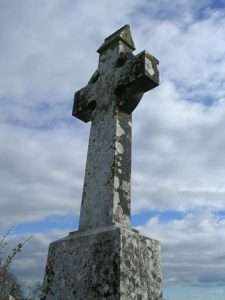A malevolent spirituality
Eighteen months short of his century, his stories are an oral history of a community. Ideally, the conversations should be recorded so that his extraordinary catalogue of recollections is not lost, but he would be dismissive of any suggestion that his memories should be preserved, and would become cautious if he thought his words might be recorded.
A chain of thoughts led him to look pensive and then begin to piece together of Mayday in his youth. Being unfamiliar with any of the beliefs and traditions he described, there were probably important details that were missed, but a story of someone being subject to a curse, and a priest having to pursue a woman and order that the curse be lifted, brought a series of associated memories. He spoke of it being impossible to churn butter and of one’s crops moving to someone else’s fields. The oddest story seemed to involve a custom of leaving eggshells between the drills of a person’s potato field.
The practices seemed entirely different from vague memories of May celebrations in England which involved dancing around a pole holding the end of a ribbon attached to the pole and May queens and flowers and happy gatherings. The English observance of Mayday seemed devoid of the sinister overtones that seemed attached to the traditions recalled.
Passing time with others later in the day, I asked what they remembered of such traditions. They spoke of the butter, and of white thorn and May bush and pishoges. There seemed a whole realm of stories and customs and beliefs of which I knew nothing.
It was disconcerting, this was far from the “Celtic spirituality” so much loved by many Christian writers in recent times. There was nothing warm and cuddly about it, there was no generosity of spirit, no unqualified hospitality, instead there seemed a great deal of jealousy, envy and malevolence.
It often seemed odd that it was only in the Twentieth Century that Christian writers seemed to develop a great interest in Celtic spirituality. Certainly, there were writers prior to that time who translated great spiritual works into English, certainly there were the writings of Patrick and other of the saints, but the interest in the popular spirituality of ancient Ireland seems much more recent. Perhaps it was because that, until recent times, communities still had vivid memories of some of the old ways, old ways that, judging by the recollections, are best now forgotten.



Comments
A malevolent spirituality — No Comments
HTML tags allowed in your comment: <a href="" title=""> <abbr title=""> <acronym title=""> <b> <blockquote cite=""> <cite> <code> <del datetime=""> <em> <i> <q cite=""> <s> <strike> <strong>